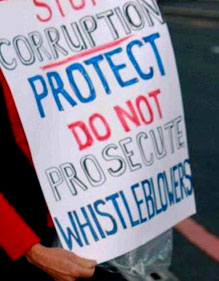|
Getting your Trinity Audio player ready...
|
 Dear Corruption Watch, I've reported corruption on your website – things going on in the body corporate where I live, and evidence to show improper payments billed to me for construction work – but you've replied that your focus is on the misuse of public resources or power. Why such a narrow focus?
Dear Corruption Watch, I've reported corruption on your website – things going on in the body corporate where I live, and evidence to show improper payments billed to me for construction work – but you've replied that your focus is on the misuse of public resources or power. Why such a narrow focus?
Private Matter
Dear Private Matter,
Corruption is traditionally defined as "the abuse of public resources and public power for private gain". The definition says nothing about the public or private sectors, but rather public resources and public power. Whoever abuses these is guilty of the offence of corruption. So, when a public official, as the custodian of public resources, connives with a private firm in a manner that abuses the public resources for which the public official is responsible, both are guilty of corruption. The payment of a bribe or a kickback in exchange for winning a public contract is a clear example.
We are as concerned about private firms and private citizens as we are about their public sector counterparts, because both make possible the abuse of public resources and public power. If it sometimes seems that we're more focused on the public sector than the private, it's because custodians of public resources and wielders of public power have a special duty to reject corruption.
This is clear in the case of public power. When the traffic officer puts on his uniform, he is given massive power: to arrest, to fine and, in prescribed circumstances, to use his firearm. He is given this power so that he may uphold the law. If this person breaks the law, we are in serious trouble.
Corruption not always easy to define
Of course, just because we have a working definition of corruption doesn't mean that there are no grey areas. Bribery is easy to identify as corruption, but other conduct may not be that simple.
Take nepotism. When does favouring someone you know become "nepotism" or "favouritism" and when is it an example of a supportive social network in action? The real test is whether the decision-maker expects something in return from the person he has favoured, which is corrupt.
Or when does the payment or acceptance of a gift constitute bribery and when is it a courtesy, an act of genuine appreciation? Partly this depends on the scale of the gift, which is often regulated, but even this does not always give absolute clarity.
There may also be grey areas with respect to the ownership of the resource in question. And so we have had to take a view on quasi-public resources such as medical aid and pension funds, the resources of charitable institutions and of unions. We have decided abusive conduct in these realms fall within our mandate.
The waters are muddied by the fact that the offence of corruption under the Prevention and Combating of Corrupt Activities Act is not restricted to the misuse of public resources or power. When a private sector supplier bribes the procurement officer in a private sector firm, the participants are guilty of corruption.
Although we would accept reports of this type of "private sector corruption", they are not our priority. First, we reason that a private sector firm is generally able to look after itself. This is not always true of the public, especially if corruption has taken hold in the police and among elected officials. Second, our principal interest is in defending the interests of the poor and marginalised because they are most dependent on publicly provided goods and services and most vulnerable to an abuse of public power.
• This article was first published in Sunday Times: Business Times


